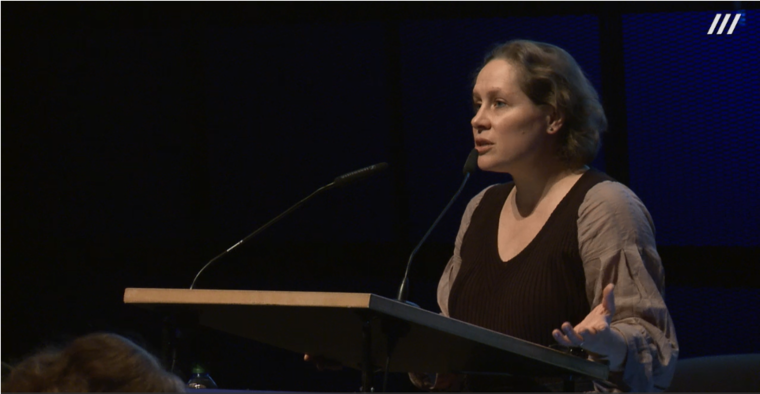London College of Communication researcher and tutor Salomé Voegelin attended the 4th Council of Europe’s Platform Exchange on Culture and Digitisation – presenting her research on Listening Across Disciplines in her presentation Listening Education: hearing the fake.
Salomé Voegelin – who is a tutor for both MA Sound Arts and BA (Hons) Sound Arts and Design and a researcher for Creative Research into Sound Arts Practice – and Anna Barney were invited to present their research at the conference, which focused on the potential of art and science as an effective means of strengthening democracy in Europe.
We spoke to Salomé about the discussions around their presentation, and the day as a whole…
Can you tell us about the conference and how your research fit in with the theme?
The 4th Council of Europe Platform Exchange on Culture and Digitisation was part of the European Council’s ongoing work to support the development of Democratic Competencies via the arts and culture. Various artists, theorists, technologists, and educators from across Europe presented their approaches, strategies and methods of how they engage in the promotion and production of such competencies, particularly in relation to digital production and communication.
From the demonstrations of their particular projects, networks and research, the conference debated what consequences and demands such approaches might make on the future of education, learning and teaching in the EU as a democratic project. Anna and myself presented our work on ‘Listening across Disciplines‘ and promoted an auditory engagement with the world as a vital competency for the development and sustainability of the democratic process.
We debated how listening as a concept, sensibility and practice, supports and develops and even demands democratic participation and thus ensures an informed engagement that avoids populism and false information. We proposed and articulated how listening provides a strategy to engage more critically in the construction of reality and thus empowers the individual and communities to recognise the asymmetries of the current socio-economic and knowledge framework, to take part in shared processes on a more equal basis and gain a voice to articulate alternatives.
Can you give us an overview of the project?
‘Listening across Disciplines’ was an Arts and Humanities Council (AHRC) funded network project, which brought together artists, musicians, scientists, technologists and social scientists as well as scholars and practitioners from the humanities to work across disciplinary boundaries on the recently emerging focus on sound and listening.
The principal and longer term aim of this network project was and is to establish a research hub that provides the infrastructure and shared terrain to develop and document, educate and disseminate information, guidelines and policies about listening as a methodology of investigation and communication in which culture and science can collide to generate new knowledge and innovative modes of knowledge production and foster a framework for participation.
Was the research as well received as you had hoped?
People, the general public as well as artists and academics, find it very difficult to fully understand listening and sound beyond language or the musical, which represent a semantic listening and thus produce a quasi visual interpretation of sound, when what we are interested in is the more experimental and ephemeral capacity of hearing.
This on the one hand makes it harder to get people to understand the research, its aims, value and use, but at the same time it makes it more important to succeed. Success in this context is the ability to persuade people of sound’s ability to make us see the hyper-invisibility of normative structures of knowledge and truth as ideological power base and to consequently use the actual-invisibility of sound to recognise and participate in the construction of alternatives. Given this challenge the research was very well received and we are currently fostering some of the links made on the day.
How long was ‘Listening Education: hearing the fake’ in the making?
This presentation did not in itself take a particularly long time to develop, but it is part of the ongoing project ‘Listening across Disciplines’ which has been in development since 2014, and for which we are working to find support and funding to continue its investigations and reach its aims.
What were you hoping for audiences to take away from the presentation?
A general sense that sound, as an uncertain and therefor demanding geography of the world, is worthwhile engaging in and deserves a place in our education system, in order to equip us all and particularly our children, with all the tools, knowledge and expertise needed to live in a contemporary world and solves its problems.
What else are you working on?
Anna and I are currently developing a standard grant application for ‘Listening across Disciplines II’, to be submitted to the AHRC shortly. ‘Listening across Disciplines II’ aims to progress our investigation into the potential of listening as a legitimate research methodology across art and science disciplines. It tries to do so through an applied process of observation, analysis and development, and represents the continuance and development of the initial network grant.
Building on the outcomes and impact of the initial grant, it is based on the international network of knowledge and skills established within that framework, and responds to the findings of the network and seeks to develop a practicable framework for listening by producing transferable listening protocols as a viable and legitimate research tool. The overall aim is to foster ‘sonic knowledge’ and ‘sonic thinking’ to pluralise and expand knowledge and the methods by which we collect, assess and interpret it.
Find out more about LCC’s Creative Research into Sound Arts Practice or explore Research at LCC
- Find out more about BA (Hons) Sound Arts & Design
- Find out more about MA Sounds Arts
- Follow LCC on Twitter to keep up-to-date with news and events



